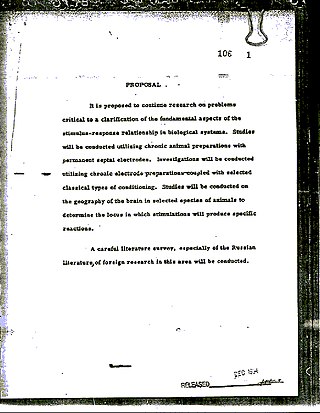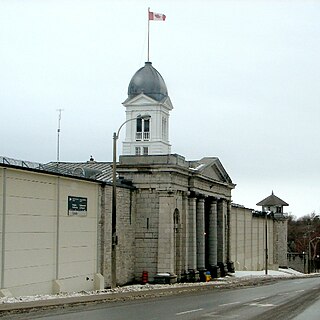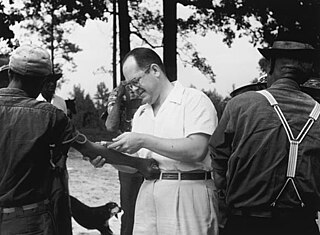Related Research Articles

Project MKUltra was an illegal human experiments program designed and undertaken by the U.S. Central Intelligence Agency (CIA) to develop procedures and identify drugs that could be used during interrogations to weaken people and force confessions through brainwashing and psychological torture. It began in 1953 and was halted in 1973. MKUltra used numerous methods to manipulate its subjects' mental states and brain functions, such as the covert administration of high doses of psychoactive drugs and other chemicals without the subjects' consent, electroshocks, hypnosis, sensory deprivation, isolation, verbal and sexual abuse, and other forms of torture.

Kingston Penitentiary is a former maximum security prison located in Kingston, Ontario, Canada, between King Street West and Lake Ontario.
Human experimentation is an issue raised by some North Korean defectors and former prisoners. They have described suffocation of prisoners in gas chambers, testing deadly chemical weapons and surgery without anesthesia.

HM Prison Forest Bank is a Category B men's private prison, in the Agecroft area of Pendlebury in Salford, England. The prison is operated by Sodexo Justice Services.
The women in prison film is a subgenre of exploitation film that began in the early 20th century and continues to the present day.
Millhaven Institution is a maximum security prison located in Bath, Ontario. Approximately 500 inmates are incarcerated at Millhaven.
Pharmacological torture is the use of psychotropic or other drugs to punish or extract information from a person. The aim is to force compliance by causing distress, which could be in the form of pain, anxiety, psychological disturbance, immobilization, or disorientation.

The Prison For Women, located in Kingston, Ontario, was a Correctional Service of Canada prison for women that functioned at a maximum security level from 1934 to 2000.

Nazi human experimentation was a series of medical experiments on prisoners by Nazi Germany in its concentration camps mainly between 1942 and 1945. There were 15,754 documented victims, of various nationalities and age groups, although the true number is believed to be more extensive. Many survived, with a quarter of documented victims being killed. Survivors generally experienced severe permanent injuries.
Throughout history, prisoners have been frequent participants in scientific, medical and social human subject research. Some of the research involving prisoners has been exploitative and cruel. Many of the modern protections for human subjects evolved in response to the abuses in prisoner research. Research involving prisoners is still conducted today, but prisoners are now one of the most highly protected groups of human subjects

Holmesburg Prison, given the nickname "The Terrordome," was a prison operated by the city of Philadelphia, Pennsylvania and the Pennsylvania Department of Prisons (PDP) from 1896 to 1995. The facility is located at 8215 Torresdale Ave in the Holmesburg section of Philadelphia. It was decommissioned in 1995 when it closed. As of today, the structure still stands and is occasionally used for prisoner overflow and work programs.
Kurt Heissmeyer was a Nazi SS physician involved in medical experimentation on concentration camp inmates including children, notably seven-year old Sergio de Simone.

Numerous experiments which are performed on human test subjects in the United States are considered unethical, because they are performed without the knowledge or informed consent of the test subjects. Such tests have been performed throughout American history, but some of them are believed to be ongoing. The experiments include the exposure of humans to many chemical and biological weapons, human radiation experiments, injections of toxic and radioactive chemicals, surgical experiments, interrogation and torture experiments, tests which involve mind-altering substances, and a wide variety of other experiments. Many of these tests are performed on children, the sick, and mentally disabled individuals, often under the guise of "medical treatment". In many of the studies, a large portion of the subjects were poor, racial minorities, or prisoners.
Albert Montgomery Kligman was an American dermatologist who co-invented Retin-A, the acne medication, with James Fulton in 1969. Kligman performed human experiments on inmates at Holmesburg Prison in Philadelphia, which led to a well-documented scandal years later. The experiments intentionally exposed humans to pathogens and dioxin, and later became a textbook example of unethical experimenting on humans. He and others involved were sued for alleged injuries, but the lawsuit was dismissed due to the statute of limitations expiring.
Kenneth Ratte is a Canadian citizen, who has been called a "career criminal". He has been convicted of over 60 crimes.
Unethical human experimentation is human experimentation that violates the principles of medical ethics. Such practices have included denying patients the right to informed consent, using pseudoscientific frameworks such as race science, and torturing people under the guise of research. Around World War II, Imperial Japan and Nazi Germany carried out brutal experiments on prisoners and civilians through groups like Unit 731 or individuals like Josef Mengele; the Nuremberg Code was developed after the war in response to the Nazi experiments. Countries have carried out brutal experiments on marginalized populations. Examples include American abuses during Project MKUltra and the Tuskegee syphilis experiments, and the mistreatment of indigenous populations in Canada and Australia. The Declaration of Helsinki, developed by the World Medical Association (WMA), is widely regarded as the cornerstone document on human research ethics.

Joan Ferguson is a fictional character in the Australian television series Wentworth, who serves as the main antagonist from season two to season five. Joan is portrayed by actress Pamela Rabe. Her storylines centre on rivalries with Will Jackson, Bea Smith and most staff and inmates. She is introduced in Season 2 as the new Governor of Wentworth Prison following Erica Davidson being fired but becomes a prisoner in Season 4 and remained until the end of the fifth season. The character was presumed dead between the sixth and seventh season, when she was revealed to be alive in the latter. She returned in the eight and final season.
The Spring Grove Experiment is a series of lysergic acid diethylamide (LSD) studies performed from 1963 to 1976 on patients with psychotic illnesses at the Spring Grove Clinic in Catonsville, Maryland. These patients were sponsored by a federal agency called the National Institute of Mental Health to be part of the first study conducted on the effects of psychedelic drugs on people with schizophrenia. The Spring Grove Experiments were adapted to study the effect of LSD and psychotherapy on patients including alcoholics, heroin addicts, neurotics, and terminally-ill cancer patients. The research done was largely conducted by the members of the Research Unit of Spring Grove State Hospital. Significant contributors to the experiments included Walter Pahnke, Albert Kurland, Sanford Unger, Richard Yensen, Stanislav Grof, William Richards, Francesco Di Leo, and Oliver Lee McCabe. Later, Spring Grove was rebuilt into the Maryland Psychiatric Research Center where studies continued to be performed for the advancement of psychiatric research. This study on LSD is the largest study on psychedelic drugs to date.

Spiderhead is a 2022 American sci-fi psychological thriller film directed by Joseph Kosinski, with a screenplay by Rhett Reese and Paul Wernick, based on the dystopian short story "Escape from Spiderhead" by George Saunders and first published in The New Yorker. The film stars Chris Hemsworth, Miles Teller, and Jurnee Smollett. The story follows inmates in a luxurious prison who participate in experiments involving mind-altering drugs. Principal photography took place in Australia in 2020.
Her Majesty's Penitentiary (HMP), located in St. John's, Newfoundland and Labrador, Canada is the primary facility for housing medium and maximum security male prisoners in Newfoundland and Labrador.
References
- 1 2 "Canada: Prisoners used as guinea pigs". CounterPunch. 18 October 1999.
- ↑ "Dorothy Proctor Radio Documentary" (PDF). CBC. Retrieved 9 January 2014.
- ↑ Proctor, Dorothy; Rosen, Fred (1994). Chameleon: the lives of Dorothy Proctor . Far Hills, New Jersey: New Horizon Press. ISBN 9780882820996.
- ↑ "Review: Chameleon". Publishers Weekly. 29 August 1994.
- ↑ "Former inmate sues over LSD experiments". CBC News. 7 October 1998. Archived from the original on 14 June 2021. Retrieved 25 June 2024.
- 1 2 OSBORNE, GERAINT B. (July 2006). "Scientific Experimentation on Canadian Inmates, 1955 to 1975". The Howard Journal of Criminal Justice. 45 (3): 284–306. doi:10.1111/j.1468-2311.2006.00422.x. S2CID 144645846.
- ↑ "Dorothy Proctor: a survivor of prison experiments". CKUT. 2 May 2013.
- ↑ Bronskill, Jim; Blanchfield, Mike (23 June 2001). "LSD guinea pig wins in court". Ottawa Citizen. p. A1.